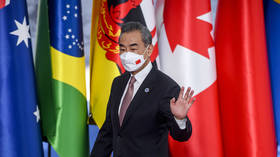Sanctions could see creditors lose billions in Russian loans

Russia could leave Western investors with huge losses if it is not allowed to pay off bond holders due to its foreign currency holdings being frozen abroad.
According to the World Bank, the country is edging closer to a default, however, analysts point out that this is a technicality due to the fact that Russia can pay its debt using the ruble instead of the currency in which the bonds were issued.
Russia is “in square default territory,” said the World Bank’s chief economist, Carmen Reinhart, according to Reuters. She added that the country is “not rated by the agencies as a selective default yet, but mighty close.” According to Reinhart, the same goes for Belarus as well.
Fitch ratings agency downgraded Russia’s sovereign rating further into junk territory on Tuesday, saying a default was imminent. Russia is due to pay $107 million in coupon payments on two bonds on March 16. Foreign banks have exposure of just over $121 billion to Russia with much of that concentrated in European lenders, according to data from the Bank of International Settlements cited by Reuters.
Russia is unable to pay back creditors in foreign currency because restrictions on its banking system imposed by the EU and the US have seen hundreds of billions of dollars worth of reserves Moscow had been stockpiling for years frozen abroad and out of reach. The country has also been effectively cut off from international money markets.
Russia maintains that it will pay its debt, but in its national currency, if the country's foreign exchange reserves remain frozen. Last week, President Vladimir Putin signed a decree on servicing foreign-held debt, allowing Russia and Russian companies to pay foreign creditors in rubles, as a way of preventing default. According to the decree, payments will be considered executed if they are carried out in rubles at the central bank’s official exchange rate.
Fitch’s decision to downgrade Russia’s foreign currency debt rating to imminent default is based on a technicality, a leading Russian investor suggested to RIA Novosti on Wednesday. Fitch is expecting that Russia will pay on Eurobonds in a currency that is different from the one in which the securities were issued, the CEO of Aricapital Investment fund Alexey Tretyakov explained.
If the debtor wants to make payments in another currency, it’s necessary to restructure the debt and the majority of bondholders must agree to the restructuring – if that doesn’t happen, then there is a default, he says.
The Russian Central Bank has introduced a number of measures to hold on to the foreign currency it has. The regulator imposed restrictions on currency exchange within Russia, restricted money transfers abroad, more than doubled interest rates to 20%, temporarily banned Russian brokers from selling securities held by foreigners, and suspended interest payments to overseas investors.
Additionally, the Russian government eliminated value added tax (VAT) on the purchase of gold by individuals to give Russian citizens the opportunity to invest in the precious metal rather than foreign currency.
For more stories on economy & finance visit RT's business section













